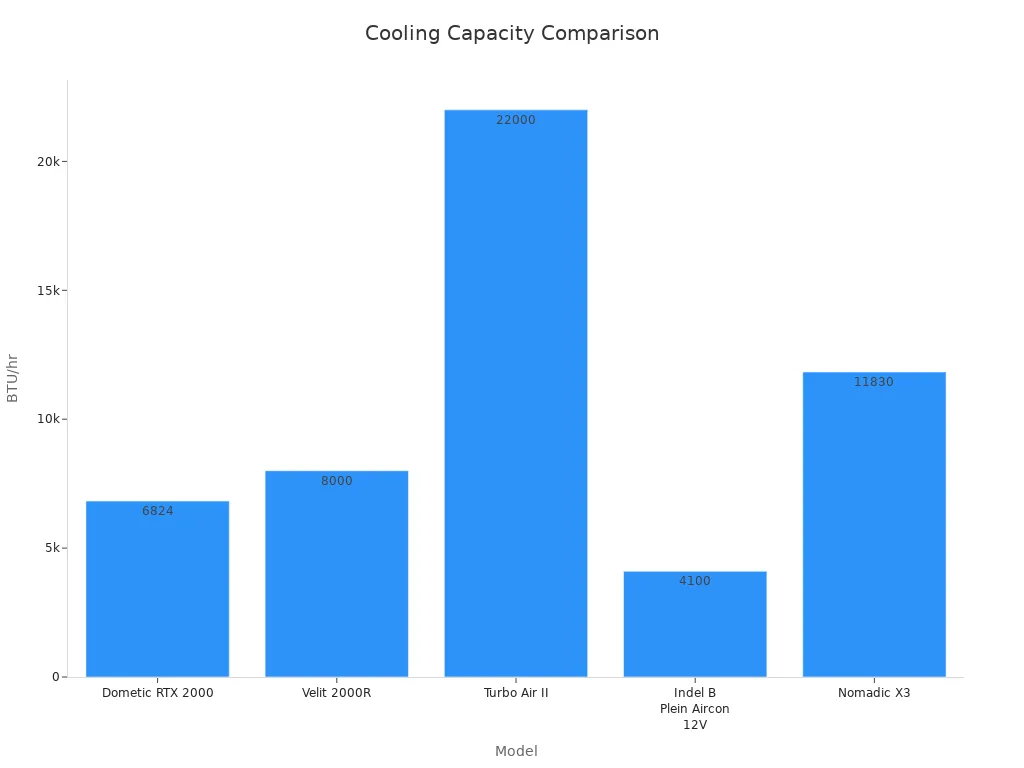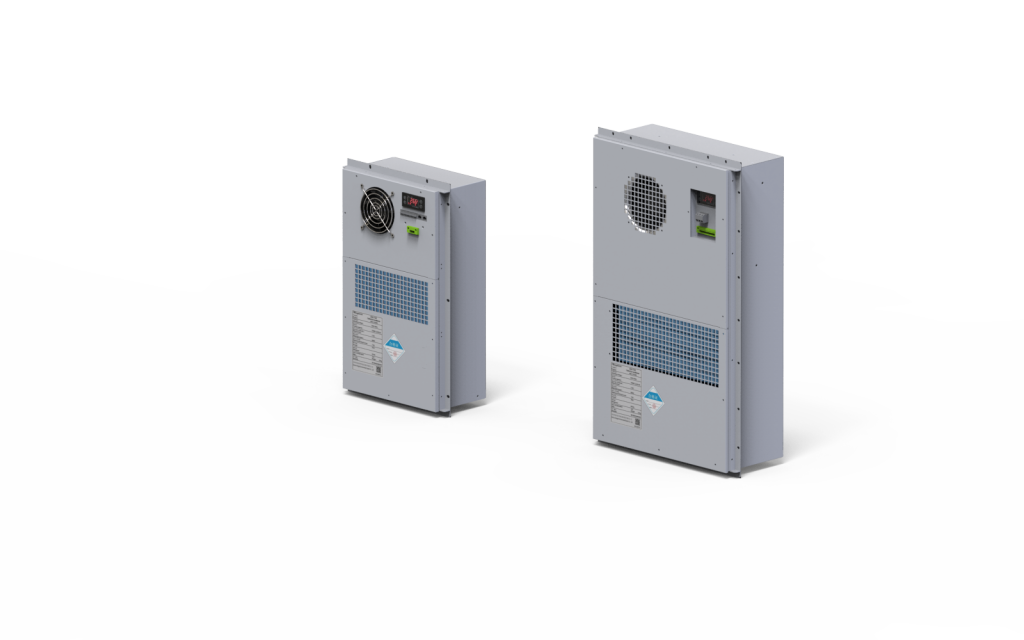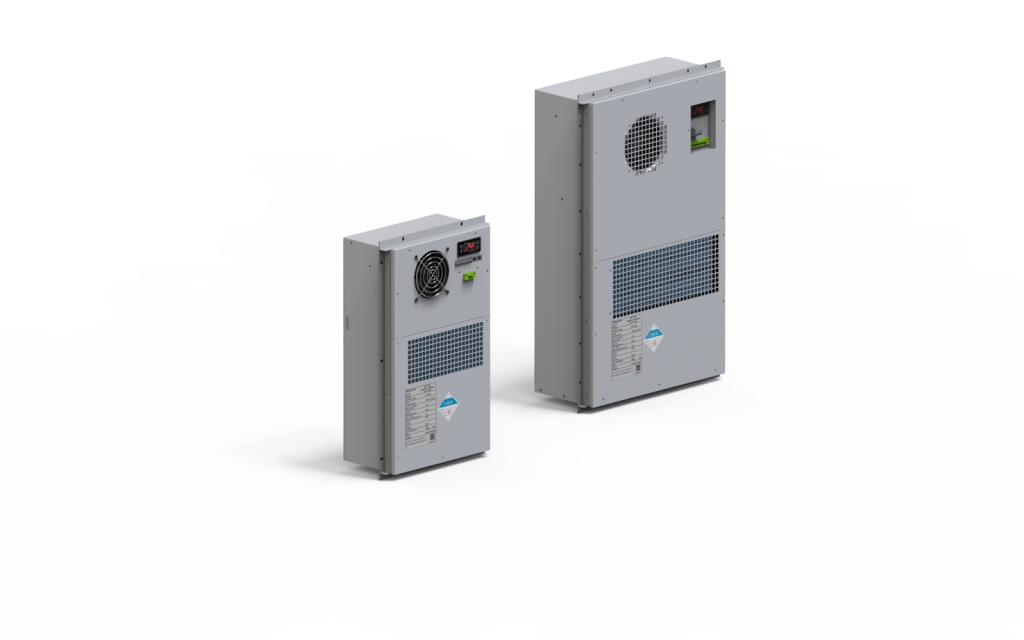A DC air conditioner is also called aircon dc. It uses direct current to cool your room. You can use batteries or solar panels to power it. This makes it great for places without regular electricity. Many studies show DC systems use less energy. You can save between 2% and 25% on energy. In Austin, Texas, homes with DC air conditioning saved 7–16% energy.
| Appliance / Metric | Numerical Statistic / Finding |
|---|---|
| Power consumption reduction by brushless DC (BLDC) motors vs baseline AC motors | Up to 50% less power used |
| Energy savings from converting houses to DC power | More than 25% energy saved |
Key Takeaways
- DC air conditioners get power from batteries or solar panels. This makes them great for places without steady electricity.
- These systems can save up to 44% energy. They help you pay less for power and make less pollution.
- Variable speed compressors and inverter technology keep cooling steady. They are quieter and work better than regular air conditioners.
- DC air conditioners are small and quiet. They are good for small spaces like RVs, boats, and off-grid homes.
- They cost more at first and cool smaller areas. But DC units save money over time and work well with renewable energy.
What Is Aircon DC
DC Power Basics
Aircon dc systems cool spaces using direct current. They get power from batteries or solar panels. Traditional air conditioners need alternating current from the grid. Aircon dc units connect right to renewable energy sources. This is good for places without steady electricity.
Tip: DC power moves in only one direction. This helps battery and solar devices work better. Less energy is lost, so your system lasts longer on the same power.
You can find aircon dc units in many places:
- Recreational vehicles (RVs)
- Trucks and long-haul vehicles
- Off-grid homes and cabins
- Remote telecom stations
- Boats and marine applications
More people want these systems now. This is true in places with weak electricity. Here are some important trends:
- Reports say off-grid photovoltaic air conditioners will grow over 15% each year for five years.
- Homes use about 45% of these systems.
- In Sub-Saharan Africa, 580 million people do not have electricity. This makes solar cooling more needed.
- Governments and new technology make these systems cheaper and easier to get.
- About 41% of rural African homes use their own solar systems. This shows many people like off-grid technology.
- Businesses and factories now use 35% and 20% of these systems. So, they are not just for homes anymore.
Key Components
Aircon dc systems have special parts for good cooling. They are different from regular AC-powered units. Here is a table with important features:
| Feature | Specification / Performance Metric |
|---|---|
| Compressor Type | COPELAND, PANASONIC, HIGHLY, MITSUBISHI |
| Operating Voltage | 12V, 24V, 48V DC |
| Refrigerant | R134A, R290 |
| Current Range | 6A to 8.6A |
| Cooling Capacity | 500W to 1,067W (approx. 3,638 Btu) |
| Coefficient of Performance (COP) | Greater than 3.0 |
| Inverter Compressor | Yes, for improved efficiency |
| High Temperature Operation | Up to 55°C |
These features help you in many ways:
- Variable speed DC compressors use less energy.
- These compressors work at low voltages and use brushless motors. They last longer and need less fixing.
- You can connect DC compressors straight to solar panels. You do not need a power inverter. This saves energy.
- Variable speed can make cooling better by over 30%. It can also make solar power work almost 46% better.
- The system keeps power use steady, even if it gets hotter outside.
When you check real-world use, you see how these parts help off-grid places. Here is a table comparing popular DC air conditioning models for vans and off-grid use:
| Metric | Dometic RTX 2000 | Velit 2000R | Turbo Air II | Indel B Plein Aircon 12V | Nomadic X3 |
|---|---|---|---|---|---|
| Retail Cost (USD) | $3,099.97 | $1,599.00 | $2,995.00 | $4,484.00 | N/A |
| Cooling Capacity (BTU/hr) | 6824 | 8000 | 22000 | 4100 | 11830 |
| 1-hr Temperature Pull Down (from 100F) | 78F | 82F | 81.3F | 85.3F | 85F |
| Runtime on 200Ah Battery (minutes) | 287 (4h47m) | 256 (4h16m) | 230 (3h50m) | 221 (3h41m) | 218 (3h38m) |
| Max Current @12V (Amps) | 51.9 | 64.2 | 57.4 | 55.8 | 89.6 |
| Additional Runtime on Extra 200Ah Battery (minutes) | 335 (5h35m) | 253 (4h13m) | 226 (3h46m) | 230 (3h50m) | 242 (4h2m) |
You can see how cooling and battery time change by model. The coefficient of performance (COP) for these units is between 2.2 and 2.4. This means they turn electricity into cooling very well. The design of each part, like the compressor and fans, changes how well the system works.

You need good DC energy meters to see how much power your aircon dc system uses. New meters check both voltage and current. This helps you use less energy and keep your battery working longer. This is very important if you live off-grid or use solar panels.
Note: Aircon dc systems are small and light. You can put them in tight spaces. They work well in faraway places with little power.
How It Works

Vapor Compression
Vapor compression is how an aircon dc system cools. The compressor squeezes the refrigerant gas. This makes the gas hot. The hot gas moves through coils. The coils send heat outside. The refrigerant cools down and becomes a liquid. It goes through an expansion valve and gets colder. The cold refrigerant takes heat from the air in your room. A fan pushes this cool air into your space. This lowers the room’s temperature.
The compressor and fans use direct current for power. You can use batteries or solar panels for this. There is no need to change AC power to DC power. This saves energy and makes the system work better off-grid.
Tip: Using vapor compression with DC power gives steady cooling. You lose less energy. This is good for small spaces and moving vehicles.
Inverter Technology
Inverter technology helps you control your aircon dc system. The inverter changes how fast the compressor motor runs. It does this by changing the voltage and frequency of DC power. The compressor does not need to turn off and on all the time. The inverter lets it run at different speeds.
This keeps the room temperature steady. You do not get big changes in how cool it feels. The compressor uses less energy because it does not waste power starting and stopping. The Department of Energy tested these systems. They found inverters help save energy, especially when you do not need full cooling. The inverter keeps the compressor running slow when needed. This is more efficient.
| Feature | Benefit for You |
|---|---|
| Smooth compressor speed | Less noise and longer life |
| Steady temperature | More comfort in your space |
| Lower energy use | Smaller battery or solar setup |
Variable Speed Operation
Variable speed operation lets your aircon dc system change its cooling power. The compressor can go fast for quick cooling. It can slow down to keep the room cool. This means you do not waste energy.
The system works better because it does not turn off and on a lot. The Department of Energy found single-speed compressors lose power when they cycle. Variable speed compressors do not have this problem. They run at the right speed for better cooling and less energy loss. Industry standards now test variable speed systems. These tests show you get more comfort and better efficiency.
Note: With variable speed operation, your aircon dc system can run longer on the same battery. It is also quieter and parts last longer.
Aircon DC vs. AC Units
Energy Efficiency
You want your air conditioner to use less power. This helps you save money. Aircon dc systems are special because they use direct current. They also use inverter technology. The compressor can change its speed to match what you need. Traditional AC units have fixed-speed compressors. These turn on and off a lot. That wastes energy.
Look at this table to see how much energy each type uses:
| Metric | Inverter (DC) AC | Traditional (Non-inverter) AC | Energy Savings |
|---|---|---|---|
| Average daily energy consumption | ~11.6 kWh/day | ~20.8 kWh/day | ~44% savings |
| Annual energy consumption (300-day cooling period) | ~3,471 kWh/year | ~6,230 kWh/year | ~44% savings |
| Alternative pattern of annual consumption | ~3,068 kWh/year | ~5,703 kWh/year | ~46% savings |
You can save up to 44% on energy with aircon dc. If you use solar panels or batteries, you save even more. You also help the planet by making less CO2.
Noise and Performance
Aircon dc units are much quieter than regular AC units. The variable speed compressor does not keep starting and stopping. It runs smoothly at the speed you need. This means less noise and fewer shakes. You get steady cooling and a comfy room.
Traditional AC units can be loud. The compressor turns on at full power. This makes a sudden noise and uneven cooling. With aircon dc, your space is peaceful. You also get better temperature control.
Tip: If you want quiet for your bedroom, RV, or office, pick aircon dc.
Cost Comparison
Aircon dc units cost more when you buy them. This is because they have advanced technology and special parts. But you save money over time by using less energy. If you live off-grid or use solar power, you do not need inverters or extra wires. You also spend less on fixing it because there are fewer moving parts.
Traditional AC units are cheaper to buy. But they use more electricity. You might pay more each month for energy. If you want to save money in the long run, aircon dc is a smart choice.
Pros and Cons
Advantages
Picking a DC air conditioner gives you many good things. These systems work with solar panels and batteries. You can use them where power is not always there. This is great for RVs, boats, and off-grid homes. You save energy because they use inverter technology and variable speed compressors. These features help you pay less for electricity and produce less pollution.
DC air conditioners are quiet when they run. The compressor does not keep turning on and off. It changes speed to cool your space just right. This means less noise and smoother running. You feel more comfortable because the temperature stays the same. Many DC models are small and light. You can put them in tight spaces or vehicles with little room.
Tip: If you want to use solar power or live off-grid, a DC air conditioner gives you more choices and freedom.
Drawbacks
Even though DC air conditioners have many good points, there are some downsides:
- You pay more at first. DC units have special parts like inverter compressors and solar-ready electronics.
- They do not cool as much as regular AC units. Most DC models cool between 500W and 1,067W (about 3,638 BTU). Regular AC units can cool bigger spaces, from 12,000 to 24,000 BTU.
- Some DC air conditioners, like thermoelectric types, cannot cool big rooms or open spaces well.
- Like all air conditioners, DC units can spread germs if you do not clean them often. Cleaning is important for your health.
- DC air conditioners work best in small places. They do not have enough power for big homes or offices.
- You need to clean the filters and coils a lot, especially if it is dusty or you move the unit, to keep it working well.
Note: Always check your space and cooling needs before you pick a DC air conditioner. This helps you get the right system and not be let down.
Applications
Common Uses
Aircon dc systems work in many places where regular air conditioners do not. They are great for off-grid RVs, tiny homes, and cabins. You also find them in boats, trucks, and faraway telecom stations. Many people use aircon dc for backup at home when the power goes out.
Here is a table that shows how these systems help in real off-grid setups:
| Statistic / Feature | Details / Values |
|---|---|
| Power draw of RV mini split AC units | 400-1200 watts, depending on load and ambient temperature |
| Battery capacity example | 8.4 kWh battery charged from zero to full in ~75 minutes |
| Inverter output capacity | Up to 3,840 watts (e.g., BLUETTI Apex 300) |
| Energy density improvement | 40% higher energy density compared to similar products |
| AC idle power drain | Ultra-low 20 watts, enabling up to 40% longer runtime for connected devices |
| Power system modular capacity | Expandable up to 45 kWh (EcoFlow 48V Power Kit) |
| Charging speed | Up to 12 kWh per hour via solar, shore power, alternator, or generator |
| RV-specific outlets | Includes NEMA TT-30R and NEMA 14-50R ports for direct RV charging without adapters |
| Typical applications | Off-grid RVs, tiny homes, emergency home backup |
| Advantages of DC-powered mini splits | Higher efficiency, quieter operation, inverter technology, flexible installation, all-season use |
You get many good things from these systems. They use less power, so your batteries last longer. Inverter technology lets the compressor change speed. This saves energy and helps your power system. These systems are quiet, so small spaces feel nicer. You can put them in tight spots like RVs and boats. The heat pump gives you both cool and warm air, even when it is cold outside.
Tip: Aircon dc is a good choice if you want to stay cool and save energy in off-grid places.
Who Should Consider
Aircon dc is best for people who live or travel where there is little or no power from the grid. These systems are great for:
- RV owners who camp off-grid and need good cooling.
- Tiny home people who use solar or battery power.
- Boat owners who want quiet and low-power air conditioning.
- People in remote cabins or country areas with weak electricity.
- Homeowners who want backup cooling when the power goes out.
If you want to save energy, have quiet air, and install your system easily, aircon dc is a good fit. You also help the planet if you use less power or use renewable energy. These systems keep you comfy while using less electricity.
You get special benefits when you pick a DC air conditioner. These systems use smart cooling and can change their speed. This helps them work better and use less energy than old models. Studies show new designs help lower pollution and save you money over time. If you want steady cooling off-grid or want to pay less for power, think about getting a DC air conditioner next time.
FAQ
What is the main difference between a DC air conditioner and a regular AC unit?
You power a DC air conditioner with direct current from batteries or solar panels. Regular AC units use alternating current from the grid. DC models work better for off-grid or mobile setups.
Can you run a DC air conditioner directly from solar panels?
Yes, you can connect many DC air conditioners straight to solar panels. You do not need an inverter. This setup saves energy and works well for off-grid living.
How much maintenance does a DC air conditioner need?
You should clean the filters and coils every month. Check the wiring and battery connections often. Regular care helps your system last longer and cool better.
How long will a DC air conditioner run on batteries?
Battery runtime depends on the battery size and the air conditioner’s power draw. For example:
| Battery Size | Typical Runtime (Hours) |
|---|---|
| 100Ah | 2–3 |
| 200Ah | 4–6 |
Tip: Use larger batteries for longer cooling times.
Are DC air conditioners safe for small spaces like RVs or boats?
Yes, DC air conditioners are safe for small spaces. They use low voltage and have built-in safety features. You must install them correctly and keep vents clear for best results.





